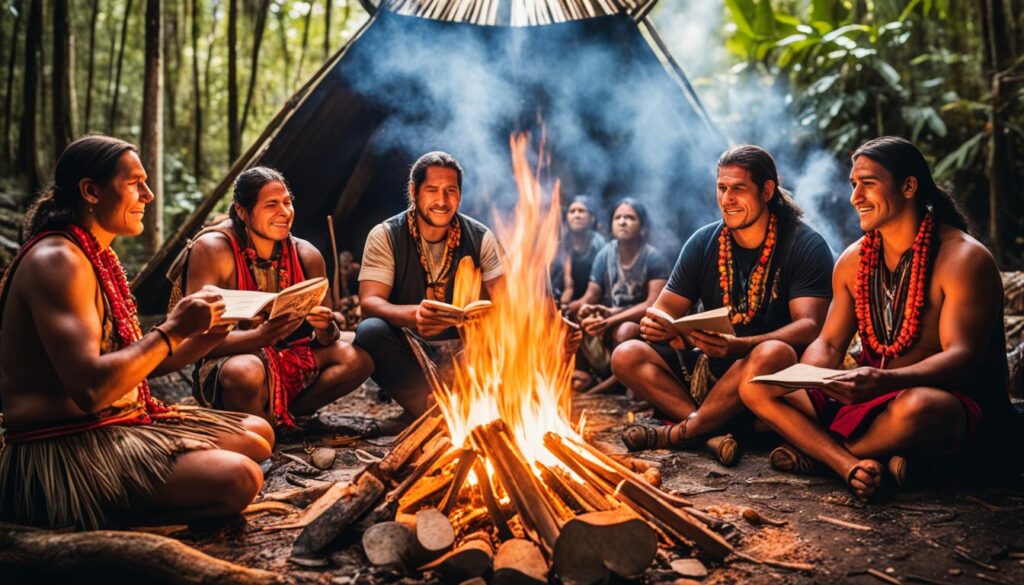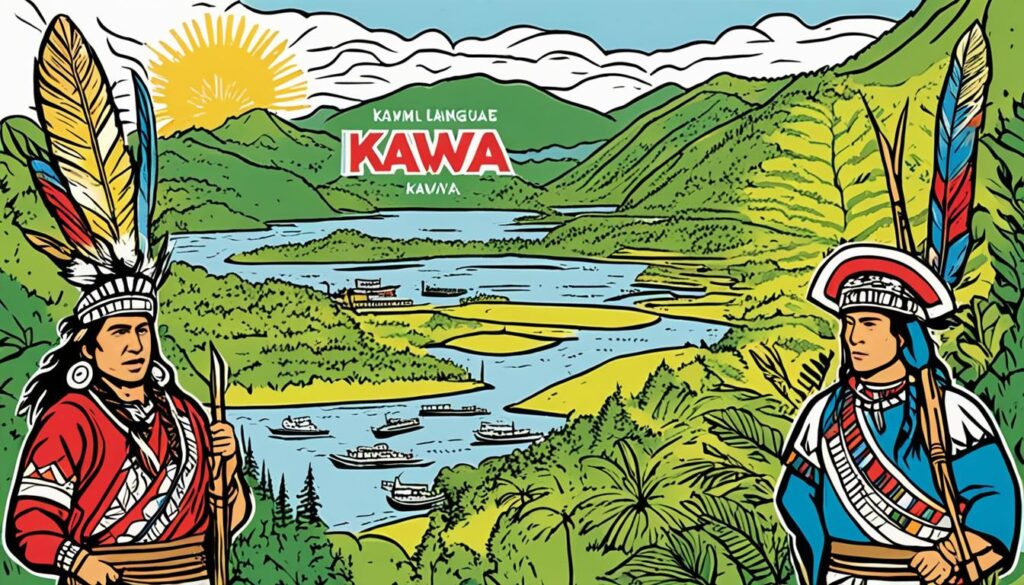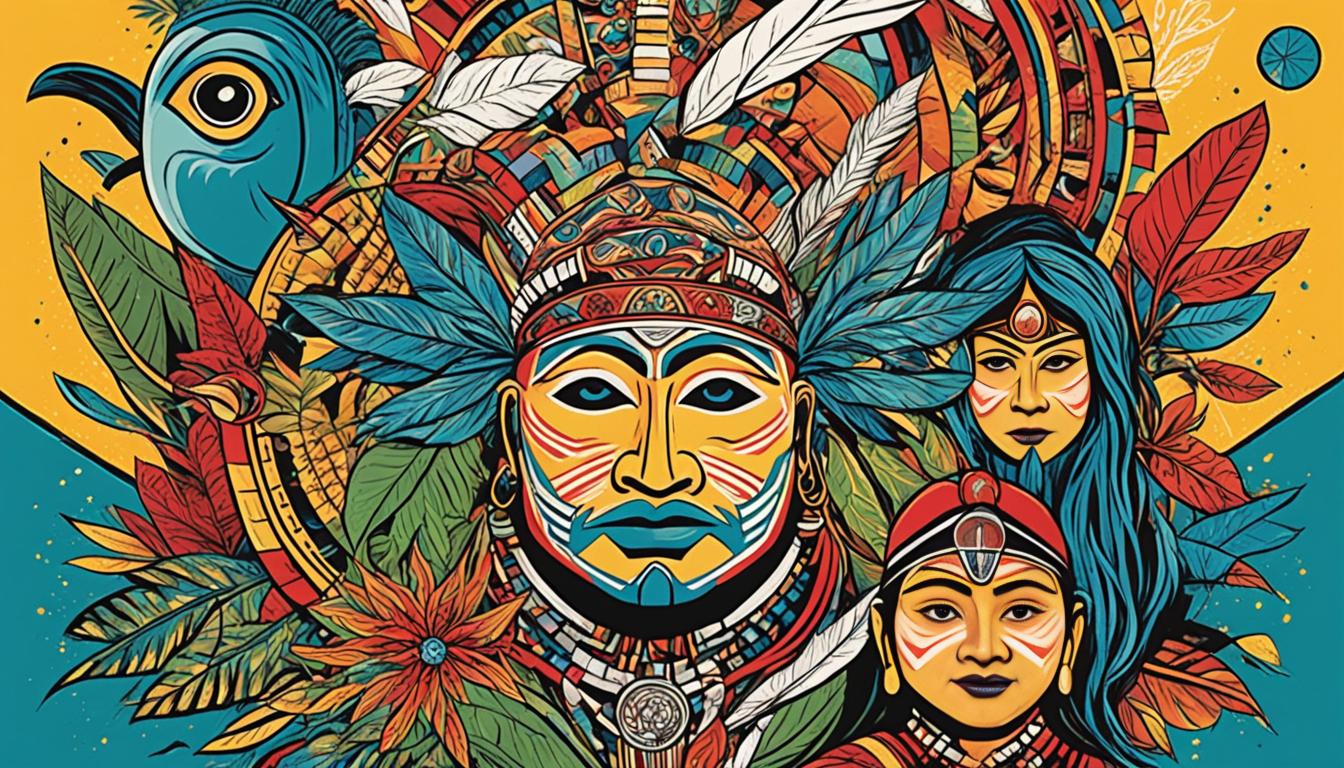Did you know that the Kaiwá language, an indigenous language spoken by the Kaiwá people in Brazil, is considered endangered?
With only about 18,000 Kaiwá speakers in Mato Grosso do Sul, Brazil, and 510 speakers in northeastern Argentina, the Kaiwá language faces the risk of disappearing, along with its rich linguistic and cultural heritage. As part of Brazil’s linguistic diversity, the preservation and revitalization of indigenous languages like Kaiwá are of utmost importance.
In this article, we will explore the significance of the Kaiwá language as a native language, its endangered status, and the efforts being made for language revitalization, preservation, and documentation. Join us on this journey to uncover the cultural richness embedded in the Kaiwá language and the importance of preserving indigenous languages for future generations.
Importance of Indigenous Languages for Cultural Heritage
Indigenous languages, like Kaiwá, hold immense significance in preserving a country’s cultural heritage. These languages serve as a repository of indigenous communities’ rich history, traditions, and ancestral wisdom. They are integral to their cultural identity and provide a sense of pride for native speakers.
One of the key contributions of indigenous languages is their role in maintaining linguistic diversity. Each language represents a unique system of communication, capturing the specific nuances and worldviews of the community that speaks it. Language diversity is essential for the holistic understanding of human cultures and cultivating respect for different ways of life.
However, many indigenous languages face the threat of extinction. The processes of language shift and assimilation, driven by globalizing influences and social inequalities, often leave these languages endangered. Language documentation plays a vital role in preserving and protecting indigenous languages for future generations.
“Language, the tool through which culture is conveyed, is a fundamental element of intangible heritage.”
Language documentation involves the systematic study, recording, and analysis of the linguistic features and cultural context of endangered languages. This documentation not only creates valuable linguistic resources but also facilitates language revitalization efforts. It provides a foundation for creating learning materials, dictionaries, and grammatical descriptions that aid in language preservation and revitalization.
Through language documentation, linguists and researchers contribute to a deeper understanding of language evolution, cultural expression, and human communication. The knowledge gained from linguistic studies enhances our appreciation of linguistic diversity and the interconnectedness of human societies.
Preserving indigenous languages is not only a responsibility but also an opportunity to safeguard cultural heritage and promote intercultural understanding. By valuing and supporting the documentation and revitalization of indigenous languages like Kaiwá, we contribute to the preservation of our collective linguistic heritage and celebrate the diverse tapestry of human culture.
Language Revitalization Efforts for Kaiwá Language
The Kaiwá language, being an endangered language, requires urgent efforts for revitalization to ensure its survival and promote the preservation of indigenous languages. The Kaiwá community is actively involved in various initiatives aimed at promoting the use and learning of Kaiwá.
Language immersion programs form an integral part of these efforts, providing opportunities for individuals to immerse themselves in the language and culture, thereby fostering language proficiency and fluency. Additionally, community language classes are organized to facilitate the teaching and learning of Kaiwá among community members of all ages, enabling the transfer of language knowledge from one generation to another.
Cultural events play a significant role in the language revitalization process. These events serve as platforms for Kaiwá language speakers to come together, celebrate their cultural heritage, and use the language in real-life contexts, reinforcing its importance and vitality.
The development of educational materials in Kaiwá is another crucial aspect of these revitalization efforts. Creating textbooks, audiovisual resources, and online learning platforms in Kaiwá facilitates access to quality language education and promotes the language’s usage in various formal educational settings.
By implementing these initiatives, the Kaiwá community strives to revitalize the language, empower its speakers, and create a sustainable environment for the Kaiwá language to thrive for future generations.

The Importance of Language Revitalization
“Language revitalization is essential for the preservation of linguistic diversity and the cultural heritage of indigenous communities.”
Without language revitalization efforts, endangered languages like Kaiwá are at risk of disappearing, resulting in a significant loss of cultural identity, traditional knowledge, and unique ways of communication. By revitalizing the Kaiwá language, we contribute to the preservation of indigenous cultures and strengthen the linguistic diversity of our world.
Challenges Faced by the Kaiwá Language
The Kaiwá language, an endangered language spoken by the Kaiwá people in Brazil and Argentina, confronts various linguistic challenges in its preservation and revitalization. These challenges arise from the influence of the dominant language, Portuguese, and the language shift within the Kaiwá community.
One significant challenge faced by the Kaiwá language is the impact of Portuguese, which is widely spoken and dominates the linguistic landscape in Brazil. As a result, the Kaiwá language encounters difficulty in maintaining its prominence and resisting the pressures of language assimilation.
Language shift within the Kaiwá community poses another obstacle to the preservation of the Kaiwá language. Factors such as urbanization, migration, and globalization contribute to the decline of indigenous languages by influencing language preferences and usage patterns. The younger generations, exposed to external influences, often favor the use of Portuguese over the Kaiwá language, leading to a gradual erosion of the language within the community.
Economic and social inequalities further exacerbate the challenges faced by the Kaiwá language. These inequalities can marginalize indigenous communities, limiting opportunities for language preservation and revitalization. The lack of resources and support systems hinder efforts to promote the use and learning of the Kaiwá language.
Addressing these challenges requires collective efforts. Language revitalization initiatives should be complemented with societal support and recognition of the value of indigenous languages. By fostering a sense of pride and appreciation for the Kaiwá language, communities can work towards preserving and revitalizing this important linguistic heritage.
“The preservation of the Kaiwá language is fundamental to the preservation of our culture and identity as Kaiwá people. It is a constant struggle against the forces of assimilation, but through education, community efforts, and governmental support, we can ensure the survival of our language for future generations.”
Factors Contributing to the Challenges Faced by the Kaiwá Language
| Challenges | Factors |
|---|---|
| Influence of the dominant language | Portuguese language dominance in Brazil |
| Language shift | Urbanization, migration, globalization |
| Economic and social inequalities | Marginalization of indigenous communities |
These challenges necessitate a multi-faceted approach that combines language revitalization efforts, societal awareness, and policies that recognize and protect indigenous languages. With concerted efforts, the Kaiwá language can be safeguarded and celebrated as a critical element of Brazil’s linguistic and cultural diversity.
The Role of Language Preservation in Maintaining Linguistic Diversity
Language preservation is crucial for maintaining linguistic diversity and cultural heritage. Each language represents a unique system of communication, worldview, and cultural expression. Preserving indigenous languages like Kaiwá is essential for the continued enrichment of global linguistic diversity. Language preservation efforts provide opportunities for intercultural understanding, fostering respect for different cultures and promoting multiculturalism.
Language Documentation and Its Significance for Kaiwá Language
Language documentation plays a critical role in the study and preservation of indigenous languages like Kaiwá. Linguists and researchers document and analyze the grammar, vocabulary, and usage of the language to create comprehensive linguistic resources. These resources aid language revitalization efforts by providing learning materials, dictionaries, and grammatical descriptions. Language documentation also contributes to linguistic studies and helps in understanding language evolution and human communication.
Through meticulous observation and analysis, linguists ensure that the linguistic richness of the Kaiwá language is not lost. Documentation involves recording spoken discourse, analyzing language structures, and compiling lexical databases. With this wealth of information, linguists create resources that facilitate language learning, research, and teaching.
One of the key aspects of language documentation is the creation of grammatical descriptions. These descriptions provide a systematic breakdown of the language’s structure, including phonetics, phonology, morphology, syntax, and semantics. Linguists meticulously analyze language patterns and intricacies to create comprehensive grammatical resources.
Detailed dictionaries are another crucial outcome of language documentation. These dictionaries provide translations, definitions, and examples to aid in language learning and comprehension. They allow Kaiwá speakers, learners, and researchers to access and expand their vocabulary, fostering a deeper understanding and appreciation of the language.

Language documentation is essential for the preservation of indigenous languages. It ensures that valuable linguistic and cultural knowledge is safeguarded, allowing future generations to learn and connect with their heritage.
Language documentation also contributes to linguistic studies on a broader scale. The study of indigenous languages like Kaiwá provides insights into the diversity of human communication and the evolution of languages. Comparative linguistic analysis allows researchers to uncover unique features, language families, and language contact phenomena, enriching our understanding of language as a whole.
Example of a Linguistic Resource: Kaiwá Pronouns
| Person | Singular | Dual | Plural |
|---|---|---|---|
| First | ita | iñe | iñemi |
| Second | eiret | eina | einembi |
| Third | ete | eta |
This table provides the pronoun system in the Kaiwá language, showcasing the unique forms used to represent different grammatical persons and numbers. Pronouns are integral to understanding sentence construction, discourse, and social dynamics within the Kaiwá community.
Overall, language documentation plays a vital role in the study, preservation, and revitalization of the Kaiwá language. It ensures that this indigenous language and its cultural significance continue to thrive, providing a rich tapestry of linguistic diversity and heritage for generations to come.
Conclusion
The Kaiwá language, spoken by the indigenous Kaiwá people in Brazil and Argentina, holds immense significance in preserving linguistic diversity and cultural heritage. Language revitalization and preservation efforts are crucial for ensuring the survival and vitality of the Kaiwá language. By documenting and supporting indigenous languages like Kaiwá, we can contribute to the enrichment of global linguistic diversity.
Language documentation plays a pivotal role in the study and preservation of the Kaiwá language. It enables linguists and researchers to create comprehensive linguistic resources that aid in language revitalization initiatives. Additionally, these resources provide valuable learning materials and grammatical descriptions, facilitating the teaching and learning of the Kaiwá language.
Furthermore, societal support and recognition are essential for the continued preservation of indigenous languages. By celebrating and protecting the linguistic and cultural heritage of the Kaiwá people, we can cultivate intercultural understanding and promote multiculturalism. Collaborative efforts from all stakeholders are necessary to ensure the longevity and prosperity of the Kaiwá language and its contribution to the world’s linguistic tapestry.
FAQ
What is the Kaiwá language?
The Kaiwá language is a Guarani language spoken by about 18,000 Kaiwá people in Brazil and 510 people in northeastern Argentina.
Why is the Kaiwá language important?
The Kaiwá language is important because it preserves linguistic diversity and cultural heritage, representing the history, traditions, and knowledge of the Kaiwá people.
Is the Kaiwá language endangered?
Yes, the Kaiwá language is endangered, with low levels of literacy in both Kaiwá and Portuguese, the dominant language.
What efforts are being made for the revitalization of the Kaiwá language?
Various initiatives are being undertaken, including language immersion programs, community language classes, cultural events, and the development of educational materials in Kaiwá.
What challenges does the Kaiwá language face?
The Kaiwá language faces challenges such as the influence of the dominant language, language shift within the Kaiwá community, urbanization, migration, globalization, and social inequalities.
Why is language preservation important?
Language preservation is important for maintaining linguistic diversity and cultural heritage, promoting intercultural understanding, and fostering respect for different cultures.
What is the role of language documentation in preserving the Kaiwá language?
Language documentation contributes to the study and preservation of the Kaiwá language, providing resources for language revitalization efforts and aiding in linguistic studies and understanding of human communication.
How can we celebrate and protect the linguistic and cultural heritage of the Kaiwá people?
We can celebrate and protect the linguistic and cultural heritage of the Kaiwá people through collaborative efforts, including language revitalization initiatives, language preservation, and societal support and recognition of the value of indigenous languages.
